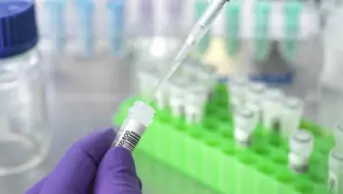
Shutterstock.com
The UK government has awarded researchers more than £400,000 to assess the clinical value of routine pharmacogenetic testing that would allow prescribers to know in advance how someone is likely to respond to medication.
Researchers at the University of Manchester are recruiting 646 people, who will be tested for genetic differences related to how they metabolise drugs.
Many drugs require activation by enzymes in the body before they work. For example, codeine must be converted into morphine by an enzyme before it is useful for pain relief.
But people’s ability to make effective versions of those enzymes varies according to common differences in their genetic code. These differences can mean some people take medicine that does not work for them or gives them unwanted side effects.
In some medical centres in the United States and the Netherlands, people admitted to hospital have a blood test for common pharmacogenetic variants, and that information is stored on their medical records to inform prescribing decisions.
In the UK, pharmacogenetics has been used to test for specific genetic variations — for example, in a rapid test for newborn babies in neonatal intensive care units, to see if they are at risk of deafness from aminoglycoside antibiotics.
The research at the University of Manchester, which was awarded £412,527 by the National Institute for Health and Care Research (NIHR), intends to find out whether it would be feasible and helpful for the NHS to test wider groups of people for a range of pharmacogenetic variants, and to hold that information on their medical records for the use of future prescribers.
John McDermott, the lead researcher and NIHR doctoral research fellow in genomic medicine, said the study is “trying to identify in which populations this would be useful”.
“There is strong evidence that [pharmacogenetics] can be used to inform prescriptions of medicines and make them safer and more effective.”
In the current phase of research, which began in July 2022, patients are being recruited from Manchester University NHS Foundation Trust. They will give blood samples to be tested for the most relevant variants in 20 genes involved in drug metabolism.
The results of the tests will then be compared with their prescribing history to see what proportion have a genetic variation related to a medicine they were prescribed.
Researchers will consider whether knowing their genetic results in advance could have influenced prescribing decisions. This will help to establish whether pre-emptive testing is clinically useful.
McDermott added that half the study participants will be recruited from the outpatient department and half from the acute medical unit to help find out whether genetic testing would be helpful in primary and secondary care.
The researchers will also look to see whether certain groups of people are more likely to benefit than others — for example, people with particular conditions or who are taking multiple medications.
McDermott said the challenge in the NHS is to find a system for storing pharmacogenomic information to “follow the patient”, so that any GP practice, hospital or community pharmacy can see it in a form that is easy to interpret and use.
He said that the raw results would be “meaningless” and needed a layer of interpretation so they could be used, adding that pharmacists will be involved in the development of this service.
“The pharmacy profession is fundamental to delivery of pharmacogenetics.”
He said most pharmacogenetics services were driven by pharmacists in terms of their development and day-to-day delivery, and that his project was working with many pharmacists through the Genomic Medicine Service Alliance.
A spokesperson for the Royal Pharmaceutical Society welcomed the research, saying that it “will help determine how pharmacogenomic testing could be deployed across the NHS to ensure all patients have an equal chance of being prescribed a medicine at a dose that is likely to be safe and effective for them”.
“Pharmacists are medicines experts with a background of scientific training and are therefore well-equipped to play an integral part in the development of pharmacogenomics.’’
The research will run until October 2024.


